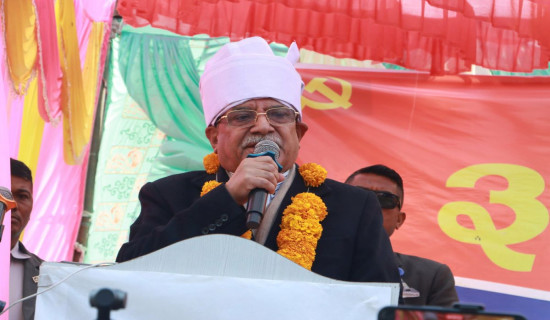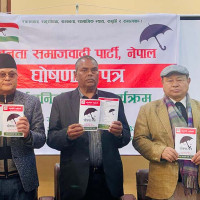- Saturday, 14 February 2026
Palliative Care For Healthcare Reform
National healthcare systems must deliver comprehensive care encompassing all phases of illness. Integrative to this approach, palliative care transcends the traditional focus on treating acute conditions. As defined by the World Health Organization (WHO), it enhances the quality of life for patients and their families confronting life-limiting illnesses by preventing and alleviating suffering. This is achieved via the early identification and proactive management of physical, psychosocial, and spiritual challenges. Palliative care is a holistic approach aimed at improving the quality of life for individuals facing serious, chronic, or life-limiting illnesses. It focuses on relieving pain and other distressing symptoms while addressing the emotional, psychological, and spiritual needs of patients and their families. Beyond medical treatment, palliative care offers emotional and psychological support to help patients and care givers cope with stress, grief, and anxiety. It also includes spiritual care and advance care planning, enabling patients to make informed decisions about their treatment preferences and end-of-life care.
A multidisciplinary team provides palliative care, ensuring comprehensive support for patients. This team typically includes palliative care physicians, oncologists, geriatricians, pulmonologists, psychiatrists, and nurses who monitor and manage symptoms. Social workers, psychologists, and counsellors are crucial in offering emotional guidance and practical support. Additionally, volunteers and community workers often contribute by providing companionship and assistance in daily caregiving, making palliative care a genuinely collaborative and compassionate effort.
Challenges
In countries with lower-middle-income status, like Nepal, where basic healthcare utilisation is already suboptimal, the idea of understanding and seeking palliative care seems beyond reach despite its necessity. It is often perceived as a luxury rather than a necessity. This challenge is particularly dire in rural areas and those with limited financial resources. For such individuals, their illnesses already pose an immense burden. Given that the terminal stages of chronic diseases are accompanied by additional complications, facing the end of their illnesses without comprehensive care would be akin to adding insult to injury.
An older woman in a remote village may have late-stage lung cancer. She will be in constant pain, struggling to breathe, but the nearest hospital is hours away. Her family, unaware that palliative care exists, believes nothing can be done except wait for the inevitable, leaving them in constant distress. With better awareness and services, she could receive pain relief, oxygen therapy, and emotional support—either at home or at a nearby health centre.
There are about 40 million people globally who require palliative care, and 78 per cent live in low- and middle-income countries where palliative care is still in its primitive stages. Only 30 countries worldwide have advanced palliative care facilities, which provide services to 14 per cent of the world population eligible for support at the end of life. Nepal ranks in the lowest 20 per cent of the world’s countries in terms of development. Along with other low-income countries with ageing populations and increasing urbanisation, it is currently facing a double burden of disease, with causes of death shifting from infectious diseases and maternal and child health disorders to noncommunicable diseases (NCDs).
Care gap
A study by Swarbrick, Eleanor M. et al. shows a high level of need for palliative care in Nepal, with the most significant contributors being cardiovascular diseases (CVD), chronic obstructive pulmonary disease (COPD), and cancer. In Nepal, most palliative care is provided for cancer patients. However, this study indicates that more palliative care is needed for patients with non-cancer conditions. This is not surprising, as cancer accounts for only 8 per cent of total deaths in Nepal, while NCDs contribute to around 60 per cent of all fatalities. However, this reality does not receive the attention it deserves.
Hospice Nepal was established in 2000 in the Kathmandu Valley as the country’s first modern hospice centre to address the issue of insufficient palliative care. Nepal has five hospices focused on cancer patients and four palliative care units within major cancer hospitals. Despite these efforts, the concept of palliative care remains unfamiliar to most people. Even today, many patients and care givers are unaware of these services, although they would likely seek them if they knew about them. The essence of palliative care differs from other types of care provided in medical hospitals because it also extends care to care givers, acknowledging their difficulties. Oftentimes, we overlook the fact that even those who help need help themselves, making it imperative to provide palliative care to those tending to terminally ill patients.
Conventionally, palliative care has been cancer-focused in our country, but research emphasises the need for services catering to non-cancer and NCDs. With limited hospice facilities, home-based care is emerging as a cost-effective and accessible solution. Programmes like Hospice Nepal are advocating for more home-care initiatives.
Efforts are being made by the healthcare system and the government to train health practitioners and primary care providers in basic palliative care to expand its availability. Telemedicine and digital health are being explored to provide palliative care consultations remotely, mainly focusing on the challenges faced by the rural communities.
Care expansion
Despite being an indispensable facet of comprehensive healthcare delivery, palliative care in the country remains limited and largely unrecognised. The growing burden of NCDs and the challenges faced by both patients and care givers underscore the urgent need for expanded access to palliative services. By raising awareness and working toward better palliative care services, the country can create a more inclusive healthcare environment that addresses the needs of both patients and care givers Training healthcare professionals to enhance service availability and integrating palliative care into healthcare policies will ensure it is not just a luxury for the few but a fundamental right for all.
The government can create a more compassionate and inclusive healthcare system by prioritising palliative care. Fostering a robust palliative care system will alleviate suffering and also enhance the quality of life for thousands of people facing life-limiting illnesses. The primary focus of caregiving should be to ensure the comfort and dignity of the individual receiving care. This commitment to comfort and dignity is paramount and should guide all aspects of the caregiving process. The emphasis on a long life should be integrated as a component of holistic and person-centred care.
(The author is a final-year MBBS student at BPKIHS, Dharan.)















